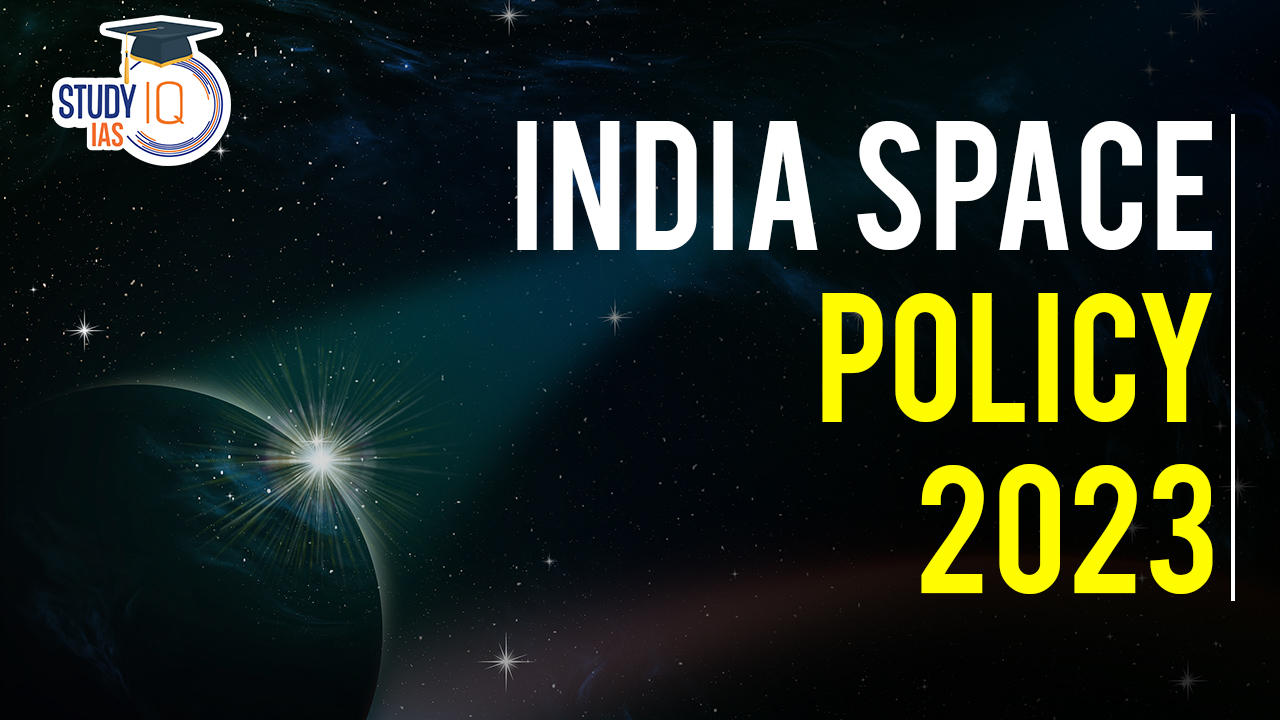Table of Contents
The Indian Space Policy 2023 envisions a robust commercial presence in space, emphasizing private-sector engagement. Key components include the Indian National Space Promotion and Authorisation Centre (IN-SPACe), a regulatory agency facilitating space activities, and the New Space India Limited (NSIL), responsible for commercializing space technologies and assets. The policy aims to redefine the role of the Indian Space Research Organization (ISRO) towards R&D and technology sharing, allowing it to concentrate on advanced initiatives and long-term projects.
We’re now on WhatsApp. Click to Join
India Space Policy 2023
The Indian Government envisions space as a catalyst for socio-economic growth, security, environmental protection, and peaceful exploration. It seeks to foster a thriving commercial space sector, driving technology advancement and international collaboration. To achieve this, private sector engagement across the space industry is promoted.
The government will establish IN-SPACe, an autonomous authority, to facilitate, regulate, and guide space activities, ensuring fairness for non-government entities. Additionally, there’s a focus on space education, innovation, and support for startups, promoting scientific awareness. The Indian Space Research Organization (ISRO) will concentrate on R&D, technology sharing, and expanding knowledge of space.
India’s Space Sector Overview
- The Indian space sector has evolved from its early days of satellite development and launching capabilities to achieving milestones in lunar exploration, Mars mission success, and expanding applications of space technology for societal development.
- The Indian space sector constitutes just 2% of the global market share, which has the potential to become 9% by 2030. (USA comprises 40%).
- The Indian Space Sector has been globally recognised for building cost-effective satellites, and now India is even taking foreign satellites to space.
- Today, while ISRO’s budget is approximately $1.6 billion, India’s space economy is over $9.6 billion. It is estimated that with an enabling environment, the Indian space industry could grow to $60 billion by 2030, directly creating more than two lakh jobs.
| Aspect | Description |
| Evolution of Indian Space | Transitioned from early satellite development to lunar exploration, Mars missions, and broader societal technology applications. |
| Global Market Share | Currently 2%, with the potential to reach 9% by 2030. (USA holds 40% of the global market share.) |
| Notable Achievements | Recognized for cost-effective satellite production and launching foreign satellites. |
| Budget and Space Economy | ISRO’s budget stands at approximately $1.6 billion, while India’s space economy exceeds $9.6 billion. Estimated potential growth to $60 billion by 2030 with over two lakh job opportunities. |
India Space Policy 2023 Provisions
- Vision of the policy: To “enable, encourage and develop a flourishing commercial presence in space”.
- Delineation of Roles: ISP delineates responsibility to the Indian Space Research Organisation (ISRO), New Space India Limited (NSIL), and the Indian National Space Promotion and Authorization Center (IN-SPACe).
|
India Space Policy 2023 Provisions |
|
| NSIL |
|
| ISRO |
|
| INSPACe |
|
- Private Sector Participation: ISP seeks to institutionalize the private sector participation in the space sector, with ISRO focusing on research and development of advanced space technologies.
- NGEs (this includes the private sector) are “allowed to undertake end-to-end activities in the space sector through establishment and operation of space objects, ground-based assets and related services, such as communication, remote sensing, navigation, etc.”.
- Satellites could be self-owned, procured or leased; communication services could be over India or outside; and remote sensing data could be disseminated in India or abroad.
- NGEs can design and operate launch vehicles for space transportation and establish their own infrastructure.
- NGEs can now make filings with the International Telecommunication Union (ITU) and engage in commercial recovery of asteroid resources.
- In short, the entire gamut of space activities is now open to the private sector. Security agencies can task NGEs to procure tailor-made solutions to address specific requirements.
India Space Policy 2023 and Private Sector
- India Lagging Behind Other Nations: Though private startups such as Agnikul Cosmos, Skyroot Aerospace, and Dhruva have launched their respective missions, India is still at a nascent stage in the private space race, well behind other nations.
- Though the government has taken steps to boost private-sector participation in space, many companies have said the large number of approvals required remains a huge barrier.
- ISP will pave the way forward with much-required clarity in space reforms and augment private industry participation to drive the space economy opportunity for the country.
- Emerging Space Industry: The Indian space industry comprises just 2% of the global market share, and this space policy will help it increase substantially to 10% in the future.
- Break the Monopoly of ISRO: The space sector has remained within the confines of ISRO with full budgetary support from the government. By institutionalizing the private sector, the ISP breaks the monopoly of the ISRO-driven space sector.
- Boost Investment by Private Sector: Allowing private companies to perform space missions has benefited nations such as the United States by promoting private sector investment.
- For example, Elon Musk’s SpaceX’s reusable Falcon 9 rockets have become a popular choice for space missions worldwide.
- Foster Innovation in Space Sector: Companies like SpaceX, Blue Origin, Virgin Galactic, and Arianespace have revolutionized the space sector by reducing costs and turnaround time, with innovation and advanced technology.
- In India however, players within the private space industry have been limited to being vendors or suppliers to the government’s space program.
- ISP’s thrust on privatization will enable the space sector to be more innovative and sustainable. It is crucial if India wants to be competitive in global space ecosystems.
- Boost Employment: Promoting the private sector will enable the Indian space program to remain cost-competitive within the global space market, and thus create several jobs in space and other related sectors.
- Better Governance: Optimal utilization of space technologies can revolutionize the delivery of governance services and boost developmental efforts.
- Foster National Security: India needs to actively participate in the emergence of cutting-edge space technology, to ensure national security and aligned strategic interests.
India Space Policy 2023 Significance
The Indian Space Policy 2023 holds significant importance for several reasons:
- Promotion of Private Sector: It encourages private sector participation in space activities, which can boost innovation, competitiveness, and economic growth.
- Technological Advancement: By focusing on technology transfer and cooperation with international partners, it facilitates the acquisition of advanced space technologies and manufacturing processes.
- ISRO’s R&D Focus: The policy redefines ISRO’s role, allowing it to concentrate on research and development, fostering the creation of cutting-edge technologies and expanding our understanding of outer space.
- Socio-economic Development: It aligns space activities with India’s socio-economic development, security, environmental protection, and peaceful exploration of outer space, highlighting its broader societal impact.
- Global Space Presence: It positions India to play a more prominent role in the global space arena and take advantage of the growing space economy.
- Job Creation: The policy’s emphasis on the private sector is expected to generate job opportunities in the space and related sectors.
- National Security: Actively participating in space technology advancements contributes to national security and aligned strategic interests.
India Space Policy 2023 Criticism
- Lack of Timeframe: The policy lacks a specific timeframe for implementation and the transition of ISRO’s practices, as well as the establishment of the regulatory framework by IN-SPACe. This makes it difficult to assess the progress and implementation of the policy.
- Absence of Clear Rules and Regulations: The policy framework requires clear and detailed rules and regulations in several areas, including foreign direct investment (FDI) and licensing, government procurement to support new space start-ups, liability provisions in case of violations, and an appellate framework for dispute settlement.
- Ambiguity in IN-SPACe’s Position and Authority: Currently, IN-SPACe’s position is ambiguous as it functions under the purview of the Department of Space. The Secretary (Space) is also Chairman of ISRO, the government entity to be regulated by IN-SPACe.
- Legislative Authority: The establishment of a regulatory body like IN-SPACe requires legislative authority to ensure its effectiveness and legitimacy. The absence of dedicated legislation could hinder its ability to enforce regulations and provide a robust regulatory framework for the space industry.
India Space Policy 2023 UPSC
India Space Policy 2023 aims to leverage space for socio-economic growth, security, and international cooperation. It emphasizes private sector involvement, establishes IN-SPACe as a regulatory agency, and encourages space education. ISRO will focus on R&D, sharing technology, and transferring mature systems to the private sector. While the space economy is $9.6 billion, with the potential to reach $60 billion by 2030, the policy lacks a specific timeframe. Detailed regulations, clarity on IN-SPACe’s authority, legislative backing, and governance rules are needed. The policy strives to boost innovation, job creation, and national security but requires refinement for effective implementation.


 AI and its Regulation in India, Limitati...
AI and its Regulation in India, Limitati...
 Tuberculosis (TB), Symptoms, Causes and ...
Tuberculosis (TB), Symptoms, Causes and ...
 Silicon Photonics Enables Low-power AI A...
Silicon Photonics Enables Low-power AI A...





















